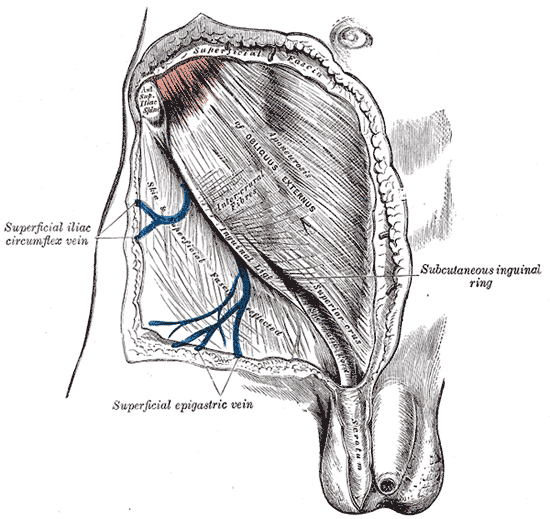Difference between revisions of "SUPERFICIAL FASCIA OF THE THIGH"
From NeuroRehab.wiki
(Imported from text file) |
(Imported from text file) |
||
| Line 1: | Line 1: | ||
[[Summary Article| | ===== [[Summary Article|'''SUMMARY''']] ===== | ||
1. Known as Fascia Lata. | |||
<br/>2. Scarpa's fascia of the abdominal wall connects to the Fascia Lata at a point lateral to the pubic tubercle <i>but below the inguinal ligament. </i>3. The saphenous opening lies below this line, hence a femoral hernia (which passes through the saphenous opening) can never lie beneath the Scarpa's fascia. | <br/>2. Scarpa's fascia of the abdominal wall connects to the Fascia Lata at a point lateral to the pubic tubercle <i>but below the inguinal ligament. </i> | ||
<br/>3. The saphenous opening lies below this line, hence a femoral hernia (which passes through the saphenous opening) can never lie beneath the Scarpa's fascia. | |||
<br/> | <br/> | ||
<br/>[[Image:Gray393.png]] | <br/>[[Image:Gray393.png]] | ||
<br/> | |||
<br/><b>Image:</b> Henry Vandyke Carter [Public domain], [https://commons.wikimedia.org/wiki/File:Gray393.png via Wikimedia Commons] [Accessed 28 Sep. 2019]. | <br/><b>Image:</b> Henry Vandyke Carter [Public domain], [https://commons.wikimedia.org/wiki/File:Gray393.png via Wikimedia Commons] [Accessed 28 Sep. 2019]. | ||
==Reference(s)== | ==Reference(s)== | ||
Revision as of 08:38, 30 December 2022
SUMMARY
1. Known as Fascia Lata.
2. Scarpa's fascia of the abdominal wall connects to the Fascia Lata at a point lateral to the pubic tubercle but below the inguinal ligament.
3. The saphenous opening lies below this line, hence a femoral hernia (which passes through the saphenous opening) can never lie beneath the Scarpa's fascia.

Image: Henry Vandyke Carter [Public domain], via Wikimedia Commons [Accessed 28 Sep. 2019].
Reference(s)
R.M.H McMinn (1998). Last’s anatomy: regional and applied. Edinburgh: Churchill Livingstone.
Gray, H., Carter, H.V. and Davidson, G. (2017). Gray’s anatomy. London: Arcturus.